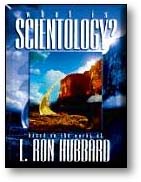
About Scientology / Scientologists

One day a few years back a local deputy sheriff handed me a copy of a beautifully presented 590-page paperbound book entitled What Is Scientology? A guidebook to the world's fastest growing religion. He told me that someone just that week had delivered a big box of these books to the local county jail to be distributed without charge to any prisoner who would accept one. He thought that I might also be interested in seeing a copy. He was right. The subject of religion always interests me, and I am particularly interested in any religion that is said to be growing faster than all others worldwide. Of course I had heard of Scientology before reading this book. In general, my impressions have not been positive, perhaps due in part to the decidedly negative disposition of the American media on the subject. The critical pieces have been ongoing and widespread, including the October '91 Reader's Digest article that termed Scientology a "dangerous cult…a racket disguised as a religion…" Five months earlier, Time magazine's cover story had referred to Scientology as a "thriving cult of greed and power…a ruthless global scam…" There are also all those multi-million dollar lawsuits that Scientology seems to constantly be filing. Many famous people like John Travolta, Kirstie Alley, and Tom Cruise are associated with Scientology, but often in controversial ways, as was the case when it was learned a few years ago that Lisa Marie Presley-Jackson was actually being used as bait to recruit her husband, Michael Jackson, into the church. All in all, it's been fairly difficult to be very objective in my analysis. By reading this book, published by the Church of Scientology itself in 1993, I felt that perhaps I might be able to give Scientology a fairer hearing. I made a sincere attempt to compensate for my predisposed orthodox Christian bias and instinctive tendency to measure what I read against Christian Scripture. Yet even from a purely objective point of view it occurs to me that there would be problems with the credibility of Scientology on at least two counts. Let me address them separately, and directly, to any of our readers who may be scientologists. If you choose to respond, perhaps we can pursue the dialogue further.
Sources and further references: What Is Scientology? (see above), The Phoenix Lectures, Hubbard, © 1969, Church of Scientology Author: Daryl E. Witmer of AIIA Institute |




